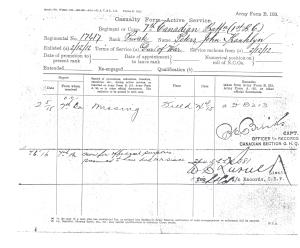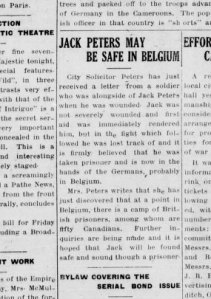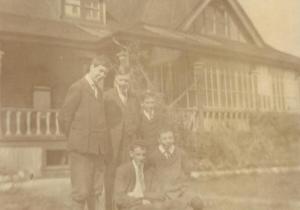Here is a list of postings on thebravestcanadian.wordpress.com blog since it started in December 2011. These postings can be accessed through the Archives list on the right side of the screen. To view the Archives listing of months, click on the About tab.
December 2011
Biography of Fritz Peters, VC to be published in 2012 – Dec. 8, 2011
Ancestry of Frederic Thornton Peters, VC – Dec. 12, 2011
Fritz Peters’ first medal was for rescue actions following Messina earthquake – Dec. 15, 2011
Hilarious BBC broadcast of 1937 fleet review by inebriated Lt.-Cmdr Woodrooffe – Dec. 16, 2011
Naming of Mount Peters near Nelson, B.C. after Canadian war hero Fritz Peters, VC – Dec. 19, 2011
Proper spelling is “Frederic Thornton Peters”, NOT “Frederick” – Dec. 21, 2011
Souvenirs from the Victoria Cross Centenary of 1956 – Dec. 22, 2011
Family of Frederic Thornton Peters – Part One: his father, the Hon. Frederick Peters, QC – Dec. 25, 2011
Family of Frederic Thornton Peters – Part Two: his mother, Roberta “Bertha” Hamilton Susan Gray, Daughter of Confederation – Dec. 25, 2011
Family of Frederic Thornton Peters – Part Three: his sister, Helen Dewdney – Dec. 26, 2011
January 2012
Family of Frederic Thornton Peters – Part Four: his brother, John Francklyn “Jack” Peters – Jan. 2, 2012
Family of Frederic Thornton Peters – Part Five: his brother, Gerald Hamilton Peters – Jan. 5, 2012
Family of Frederic Thornton Peters – Part Six: his brother, Noel Quintan Peters – Jan. 6, 2012
Family of Frederic Thornton Peters – Part Seven: his sister, Violet Avis Peters – Jan. 8, 2012
February 2012
Family of Frederic Thornton Peters – Part Eight: his four grandparents – Feb. 7, 2012
Family of Frederic Thornton Peters – Part Nine: his cousins – Feb. 21, 2012
March 2012
Peters Family Papers: family history documents – March 10, 2012
New book “The Bravest Canadian” tells the story of Capt. Frederic Thornton “Fritz” Peters, VC – March 17, 2012
Letters from Private J.F. “Jack” Peters, Part One: Dec. 1914 – February 1915 – March 24, 2012
1914 Christmas card from Lieut. Frederic Thornton Peters on HMS Meteor – March 28, 2012
April 2012
Letters from Lt. Gerald Hamilton Peters, Part One: 1915 – April 2012
Letters from Lt. Gerald Hamilton Peters, Part Two: 1916 – April 2012
Implications of the sinking of Titanic in the Fritz Peters story – April 18, 2012
Itinerary for Helen Peters Dewdney and other Canadians at the VC Centenary in England in 1956 – Apr. 20, 2012
May 2012
Family of Frederic Thornton Peters – Part Ten: his brother-in-law Ted Dewdney – May 6, 2012
June 2012
Letters from Frtiz`s Brother Jack Peters, Part Two: March 11, 1915-April 13, 1915 – June 30, 2012
August 2012
Fritz Peters cadet report in 1906 – August 18, 2012
Scandal of first wife of Dr. Charles Peters and a pirate in New York in early 1700s — August 27, 2012
Condolence letters received by Bertha Gray Peters in 1916 — August 30, 2012
September 2012
Biography of Canadian War Hero Fritz Peters, VC – September 8, 2012
October 2012
Letters reveal Fritz Peters` way of thinking and love of literature — October 19, 2012
November 2012
New information emerges on the air crash that killed Fritz Peters 70 years ago today — November 14, 2012
Author interviewed on Montreal-based The Stuph Files — November 16, 2012
“The Bravest Canadian“ now available in bookstores and online — November 17, 2012
Front cover image of book — November 18, 2012
Back cover image of book – November 18, 2012
“The Bravest Canadian“ selling well in B.C. and P.E.I. — November 18, 2012
Telling the Fritz Peters story at the Royal British Columbia Museum — November 21, 2012
Author`s presentation on Fritz Peters Nov. 10th at Royal B.C. Museum — November 21, 2012
Feature on Fritz Peters book in Victoria`s Monday Magazine — November 24, 2012
70 years ago General Eisenhower awarded Fritz with U.S. DSC medal — November 28, 2012
December 2012
Book launch event Dec. 15th at Touchstones in Nelson — December 5, 2012
“The Bravest Canadian“ launched at Touchstones Museum — December 17, 2012
Nelson Star article on `The Bravest Canadian – Fritz Peters, VC“ — December 18, 2012
Memorable quotes of Frederic Thornton Peters — December 18, 2012
January 2013
Memorable descriptions of Frederic Thornton “Fritz“ Peters — January 17, 2013
Daughter of lifelong friend Cromwell Varley has fond memories of Fritz Peters – January 18, 2013
February 2013
Genealogy event in Castlegar, B.C. on Feb.11, 2013 — February 4, 2013
“The Bravest Canadian“ reviewed in Naval Association of Canada`s Starshell magazine — February 9, 2013
P.E.I. Heritage Award and book signings in Charlottetown — February 10, 2013
Presentation on The Bravest Canadian – Fritz Peters VC` on Feb. 23rd at Hotel on Pownall — February 16, 2013
Busy in heritage-minded Charlottetown — February 22, 2013
Interview with author can be seen on CBC Charlottetown TV web link — February 22, 2013
Exploring Fritz Peters sites in Charlottetown — February 28, 2013
Fritz Peters book recognized with P.E.I. heritage award — February 28, 2013
April 2013
70 years since official announcement of F.T. Peters` Victoria Cross — April 18, 2013
Estate of Fritz Peters valued at 254 pounds — April 27, 2013
May 2013
Pte. John Francklyn Peters (1892-1915 — May 5, 2013




















